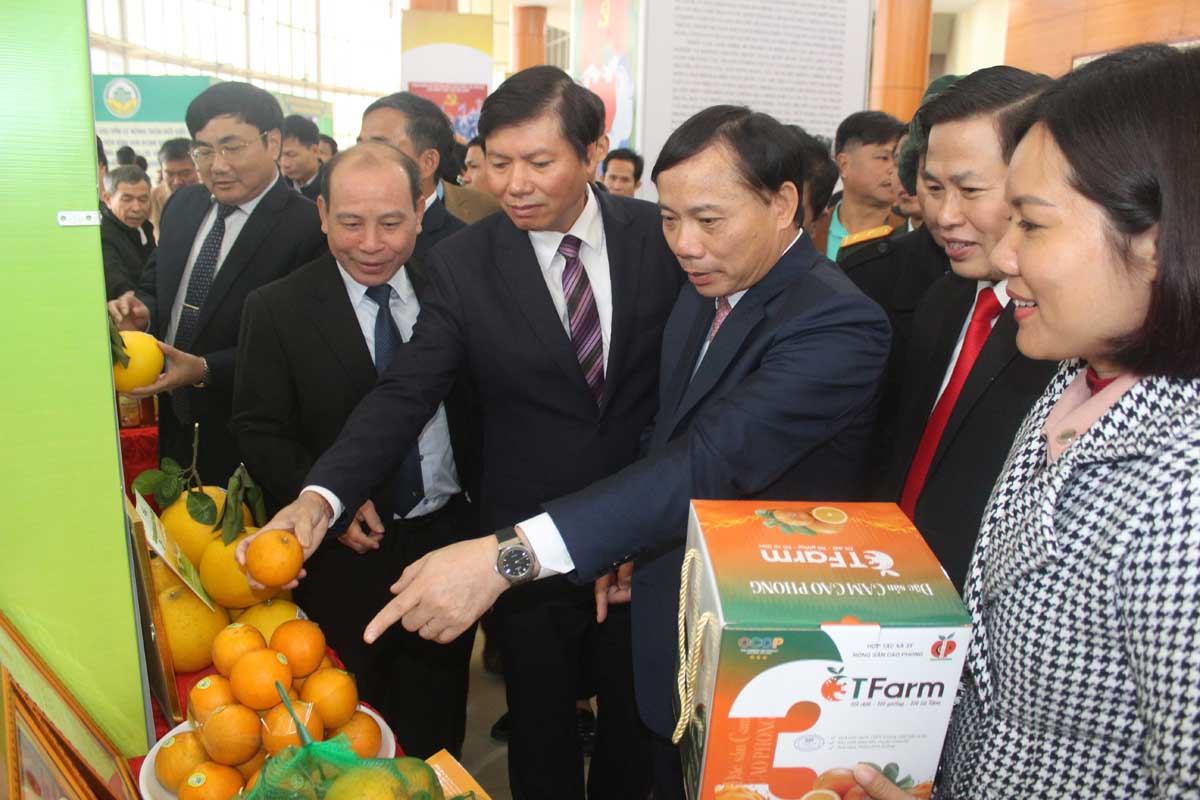
(HBO) – The Hoa Binh provincial People’s Committee on December 24 held a conference reviewing the outcomes of a contest for model new rural residential areas and model gardens for the 2018-2020 period, and presenting certificates for products meeting One Commune, One Product (OCOP) standards in 2020.
 Delegates visit stalls of OCOP products for
2020.
Delegates visit stalls of OCOP products for
2020.
In his opening speech, Vice Secretary of the
provincial Party Committee and Chairman of the provincial People’s Committee
Bui Van Khanh said during over two years of building model new-style rural
residential areas and gardens in the province, localities actively responded to
the effort with the involvement of Party units, authorities, the Vietnam Fatherland
Front, mass organisations and people from all walks of life. The movement has
so far achieved encouraging results.
When the movement began, 69 residential areas
and 219 gardens registered to join. So far, as many as 46 model new-style
residential areas and 151 model gardens have been recognised. In the near
future, districts and Hoa Binh city plan to build 100 model new-style
residential areas and 177 model gardens.
In order to spread the movement, the provincial
People’s Committee held the contest for the 2018-2020 period and earmarked
funding to help localities build green and clean landscapes at a total cost of
over 28.6 billion VND. 38 new-style rural residential areas and 47 model
gardens were selected by district and municipal authorities to compete in the
contest at provincial level.
In the model new-style rural residential area
category, the A prize went to Ho 1 hamlet (Ngoc Luong commune, Yen Thuy
district) while B prize was presented to La Van Cau hamlet (Thuong Coc commune,
Lac Son district); Doi hamlet (Ba Hang Doi township, Lac Thuy district); Sau
Thuong hamlet (Thanh Cao commune, Luong Son district). Ten hamlets won the C
prize and 22 others earned the consolation prize. As for the model garden
category, the A prize was presented to the garden of Tran Quoc Hoan’s family in
Doi hamlet (Ba Hang Doi township). Three others won the B prize, 10 with C
prize and 25 consolation prize.
Regarding the OCOP Programme, 54 products across
the province registered to join. Via evaluation and classification of OCOP
products, 44 products owned by 39 entities scored more than 50 points and were
recognised as the province’s OCOP products for 2020. As of December 31, the
province would have 75 OCOP products, or 25 higher than the set target.
In order to honour outstanding collectives and
individuals, leaders of the provincial Party Committee, People’s Committee and National
Assembly deputy delegation presented certificates of merit to model new-style
rural residential areas and model gardens, and certificates to OCOP products
meeting three- and four-starred standards.
To turn the effort into a widespread movement,
laying the foundation to build new-style rural communes at advanced standards,
Khanh asked departments, agencies and units to raise public awareness of the campaign
while continuing to fine-tune policies and mechanisms to support the building
of new-style rural areas in remote, mountainous andespecially
disadvantaged areas./.
With an increasingly vibrant and widespread emulation movement aimed at building cultured residential areas and cultured families, Yen Thuy District has been making steady progress toward improving both the material and spiritual well-being of its people, while fostering a civilized, prosperous, beautiful, and progressive community.
Once lacking recreational spaces and community facilities, Residential Group 2 in Quynh Lam Ward (Hoa Binh City) has recently received attention for the construction of a new, spacious, and fully equipped cultural house. The project followed the model of state support combined with public contributions in both labor and funding.
The "All people unite to build cultural life" movement, which has been effectively integrated with Kim Boi district’s socio-economic development goals, is fostering a lively spirit of emulation across local residential areas, hamlets, villages, public agencies, and enterprises. In addition, through the initiative, traditional cultural values are being preserved and promoted, while community solidarity and mutual support in poverty reduction and economic development are being strengthened.
A working delegation of the Hoa Binh provincial People’s Committee led by its Permanent Vice Chairman Nguyen Van Toan on June 11 inspected the progress of a project to build the Mo Muong Cultural Heritage Conservation Space linked to tourism services in Hop Phong commune, Cao Phong district.
Born and growing in the heroic land of Muong Dong, Dinh Thi Kieu Dung, a resident in Bo town of Kim Boi district, in her childhood was nurtured by the sweet lullabies of her grandmother and mother. These melodies deeply imprinted on her soul, becoming an inseparable part of her love for her ethnic group's culture. For over 20 years, this love for her hometown has driven Dung to research, collect, and pass down the cultural values of the Muong people to future generations.
In the final days of May, the Ethnic Art Troupe of Hoa Binh Province organized performances to serve the people in remote, mountainous, and particularly disadvantaged areas within the province. These were not just ordinary artistic shows, but they were the meaningful journeys aimed at spreading cultural values, enhancing the spiritual life of the people and contributing to the preservation of ethnic minority cultural identities.



 Delegates visit stalls of OCOP products for
2020.
Delegates visit stalls of OCOP products for
2020.